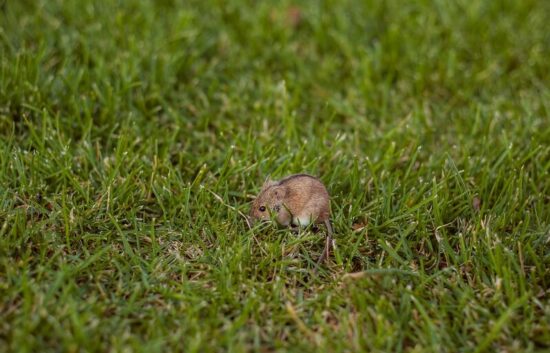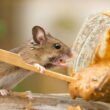It doesn’t matter who you are, everyone wants to protect their lawn. But unfortunately, there are many pests that have the opposite goal in mind!
This guide will cover if mice eat grass, and what you can do to stop them if it happens to you.
Table of Contents
Do Mice Eat Grass?
Mice are natural omnivores and some of the most opportunistic pests around. While other animals have specific food preferences, mice take what they can get! They enjoy some foods more than others, but when push comes to shove, these pests will eat what they can to survive.
In times of famine, mice are even known to turn on one another, cannibalizing others in order to make it. They can do this because of their robust digestive systems. The same digestive system allows them to move from soft fruits to high-fiber plants without struggling to process a thing!
So do mice eat grass? Most people think of cheese when they imagine mouse favorites. But many are surprised to learn that grass is high on the list of foods they enjoy eating.
Field mice and species that live predominantly outdoors feed almost exclusively on grass. It’s not hard to see why. The foliage is abundant and pretty easy to get. Pair that with its rich nutrients and vitamins, and it fits the dietary bill.
Young grass is particularly beneficial for mice. The young sprouts have high concentrations of vitamins and minerals, making them the perfect food for these rodents to eat as they try to stay healthy.
In addition to eating grass, outdoor mice often eat fruits, nuts, and other natural foods they find scavenging around your property.
But what about indoor mice? The house mice that infiltrate your domain are a bit different. Sure, they can eat grass and will benefit from it greatly. But how much natural grass do you have inside your home?
Chances are that you have barely any! House mice aren’t going to venture outdoors to get some grass when there are many other tasty foods nearby. Those pests will search for the more flavorful and aromatic snacks in your kitchen and pantry.
They prefer to look for crumbs you drop or spilled foods you forgot to pick up.
For the most part, mice will eat grass as a fallback and reliable source of nutrition. That applies to both indoor and outdoor mice. If other food sources are available, most rodents will seek those instead.
But the grass is there to fill their nutritional needs if they can’t find anything else.
What About Grass Seed?
This is a question that many homeowners have. When spring rolls around, many people spread grass seeds to prepare for a summer of outdoor fun. But in doing so, they may notice that patches of seeds mysteriously go missing.
Not only is that frustrating, but it often leads to uneven grass growth. What gives?
What likely happened is these pesky mice snuck in under your nose and ate the grass seed. Mice greatly enjoy these seeds. In fact, they may like it more than sprouted grass!
Grass seeds are high-carb foods in the same family as nuts. Mice love seeds and nuts because they are an excellent source of energizing carbs. It keeps the metabolism going strong. Many seeds also have natural oils and tons of flavor that attracts even the most discerning mouse.
If you plan on spreading grass seeds, don’t be surprised if mice start eating or stealing them at night. Mice love to scavenge under cover of night to stay safe. They’ll pack away a good amount of seed, and many will bring some back to the nest.
Mice like to eat as much as 20 times per day. Seeing a yard full of grass seed is like an endless buffet!
A single mouse can cause considerable damage, costing you tons of money and time trying to establish a lush lawn. But don’t forget to consider how quickly these pests procreate. Mice are sexually mature at four to six weeks old.
Not only that, but these rodents can mate directly after giving birth. As a result, the nest could multiply every 25 days. If you don’t do anything about this seed-stealing issue, you could end up with a costly problem and a barren backyard.
Don’t think you’re out of the water once you plant your seeds. Even if you cover them with a layer of soil, that’s nothing to a determined mouse. These pests will not hesitate to dig into the earth to eat that tasty food.
Will Fresh Grass Attract Mice To Your Yard?
So, you’re lucky enough to get over an onslaught of rodent theft as you establish your lawn. The seeds stay and begin sprouting, showing promise of life and the future of excellent curb appeal. You’re out of the woods after the grass seeds start growing, right?
Unfortunately, that’s not the case! If the seeds didn’t attract mice onto your property, the freshly growing grass will!
These rodents have a strong sense of smell. Have you ever gone outside on a dew-laden spring morning? It smells heavenly, and grass only adds to that unique experience.
Mice can smell grass growing from pretty far distances. Since we’ve established that mice eat grass, this will likely draw them in. As your lawn develops, you run the risk of having more and more rodents move in.
It’s not just lowly field mice you have to worry about, either. The grass can attract giant rats, voles, and more! That smell of fresh growing greens is irresistible. Earlier, we mentioned that mice love to eat new growth because of their nutritional density.
Well, the same applies to other pests!
Having a pristine green yard is something many homeowners want, but few realize the risks that come with it. Fresh grass can attract multiple colonies on your property. They may set up shop in hidden areas like your shed or burrow nests near trees and other well-disguised areas.
If you’re not careful, the mice that have been eating your grass can eventually get inside your house, using any opening they see to infiltrate your home and cause a mess inside.
How To Stop Mice From Eating Your Grass & Grass Seed
If mice are eating your grass, don’t worry. You can still enjoy a fresh green lawn. While there are risks, you can take steps to prevent these critters from snacking on the grass and grass seed you have on your property.
Here are a few tricks you can try.
1. Eliminate All Hiding Spots
One of the best things you can do to stop mice from eating your grass and eventually coming into your home is to remove their hiding spots.
Mice do not like to venture out during the day. They will if necessary, but most will stay under cover until nightfall. That’s when they leave the safety of their nest to munch on your grass and steal your seeds.
Use that behavior to your advantage. Eliminating hiding spots on your property can make a huge difference.
Another thing that mice hate is venturing into open spaces without an easily accessible cover spot. Keep your lawn as clear and open as possible. Remove piles of leaves and debris, and cut back any overgrown plants that the rodents could use for cover.
Removing hiding spots makes it harder for mice to eat your grass.
2. Store Extra Seed Properly
Ideally, you would not have any seeds around your property that are not directly growing. The best approach is to buy a precise amount of seeds, spread it all on your lawn, and do what you can to make sure mice don’t eat them!
Of course, that’s not a reasonable expectation for every homeowner. So if you have excess seeds, be careful about how you store them. That old paper or plastic bag they come in? That’s no match for a hungry colony of mice!
Instead, keep the seeds in a tightly closed metal container. Mice can’t chew through metal (which is why steel wool is effective), keeping your seeds safe. An airtight container can also control the aroma at bay, making it difficult for the rodents to find your stash.
3. Use Natural Repellants
One popular technique that homeowners often employ for stopping mice from eating grass is spreading rodent repellent. You can find many commercial products on the market today. There’s a good chance you have a sizable collection available at the same home improvement store where you buy the grass seeds. In fact, they may only be the next aisle over!
Take full advantage of the repellant. These products use the animal’s strong sense of smell against it. Various formulas exist, but many use strong scents and predator pheromones to keep mice out.
Keep in mind that some products use chemicals. So if you’re worried about pets, children, or the safety of your garden, you might want to try a natural alternative. For example, you can try spreading peppermint or other menthol-based water dilutions around your property.
The scent-based repellents can keep mice away from your precious grass and grass seed.
4. Set Up Traps
If all else fails, you can set up traps. Outdoor traps are capable of catching multiple mice in one night.
They typically rely on bait foods. Provide something irresistible like peanut butter, and you can catch these pests before they ruin your lawn. Hand the creatures over to animal control for relocation, and you won’t need to worry about mice eating grass!
Conclusion
Mice eat grass far more than many people realize. That’s why it’s so important to make sure that you keep these critters away from your lawn as much as possible.
If you have any questions about the information or recommendations above, let us know. We’re always willing to give our readers a hand!


